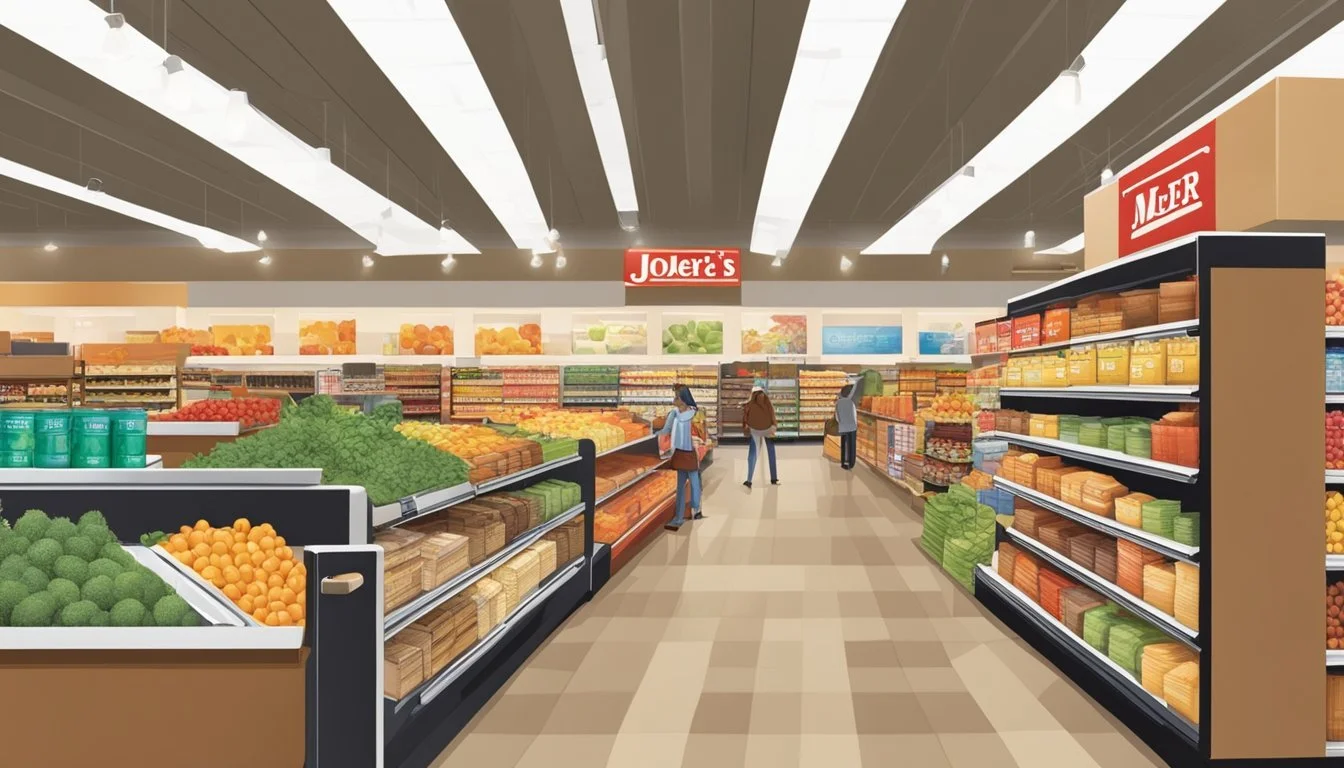Meijer vs Trader Joe's
Comparing Shopping Experience, Prices, and Quality
Part of Our Grocery Store Guide with Details on Meijer and Trader Joe's
Shopping for groceries is a weekly ritual for most households, and choosing the right grocery store can influence not just the family budget but also the quality of food on the table. Two chains frequently stand out for their distinct approaches to grocery retail: Meijer, a supercenter offering a vast array of products including groceries, and Trader Joe's, known for its unique and diverse product selection. Customers often weigh their options based on variety, cost, and shopping experience.
Meijer operates as a supercenter chain throughout the Midwest, known for its competitive prices and wide range of products including groceries. Their extensive selection accommodates a one-stop shopping experience from household goods to fresh produce. Price-wise, Meijer is recognized for its affordability, especially when considering that shoppers can save considerably over time compared to average grocery store pricing.
Trader Joe's takes a different approach, cultivating a loyal customer base with its array of private-label products that often can't be found elsewhere. Their stores are smaller and more curated than the vast aisles of Meijer, featuring an assortment of specialty items, from gourmet cheeses to organic options. Despite a smaller footprint, Trader Joe's stores emphasize quality and value, making them a contender for consumers who prioritize those factors over the breadth of selection.
Company Backgrounds
In the competitive supermarket landscape, Meijer and Trader Joe's stand out as formidable players, each with a distinct history and approach to serving their customers. These two grocery store chains have carved out niches that reflect their unique beginnings and growth strategies.
History of Meijer
Meijer began its journey in 1934, when Hendrik Meijer opened a small grocery store in Greenville, Michigan. It pioneered the concept of one-stop shopping in 1962, evolving into a supercenter format that combines groceries with department store goods. Today, Meijer operates over 250 stores, primarily in the Midwest. The family-owned company maintains its competitive edge by offering a wide variety of products under one roof.
History of Trader Joe's
Trader Joe's started in 1958 as a small chain of convenience stores called Pronto Markets. In 1967, the founder, Joe Coulombe, rebranded the stores to Trader Joe's and changed the business model to focus on unique and upscale food products. Famous for its private label items, Trader Joe's provides a curated selection of goods that often caters to the health-conscious consumer. It operates more than 500 stores nationwide, with a strong emphasis on customer experience and value.
Store Brand and Product Quality
When exploring the store brands offered by Trader Joe's and Meijer, customers will find distinct approaches to product quality and selection. Trader Joe's focuses on an upscale, private label experience with unique offerings, while Meijer has a wide range of both store-brand and name-brand products that aim to deliver affordability without sacrificing quality.
Trader Joe's Private Label Products
Trader Joe's excels in creating an exclusive atmosphere with its private label products. These offerings are typically unique to their stores, leading many to associate their brand with an upscale and distinctive shopping experience. The majority of the products on Trader Joe's shelves are store-branded, emphasizing quality and healthier options. For customers, this often translates into a selection that feels more curated than what they might find at a typical grocery store.
Product Variety: Limited to store-brand with rare outside brands
Health Focus: Emphasis on healthier and organic options
Exclusivity: Many items sold only at Trader Joe's
Meijer Brand Products
Meijer offers a robust selection of both their own store-brand and national name-brand products. The Meijer brand is designed to compete with name-brand items in terms of quality and value. Consumers can expect to find a range of products that are affordable and comparable to other brands on the market. While they may not carry the same boutique image as Trader Joe's, Meijer aims to provide consistent quality with its private label products, which are often priced lower than their national brand counterparts.
Variety: Wide range of Meijer brand and name-brand products
Pricing: Competitive pricing strategy for store-brand products
Quality Standard: Comparable quality to name-brand products at a better value
Product Range and Specialtie
When exploring the offerings of Trader Joe's and Meijer, consumers will find distinct differences in product diversity and store specialties. Trader Joe's boasts a selection of unique private label items, while Meijer offers an extensive variety of brands including organic and natural foods.
Trader Joe's Unique Offerings
Trader Joe's is renowned for its private label products that encompass a variety of organic, vegan, and gluten-free options. Their inventory is carefully curated to include unique snacks, fancy cheeses, and an assortment of seasonal products that are often exclusive to their stores. Their bakery section offers a range of artisan bread and pastries, while their produce section, although smaller than some competitors, provides a selection of organic produce. Trader Joe's also has a reputation for an eclectic assortment of international foods and ready-to-eat meals that cater to a variety of tastes.
Specialties:
Private Label Items
Artisan Cheese and Bakery
Seasonal Offerings
International Cuisine
Organic and Gluten-Free Selections
Meijer's Diverse Inventory
Meijer, on the other hand, operates on a larger scale and offers an extensive array of products ranging from groceries to general merchandise. Customers can find a wide selection of fresh produce, including both conventional and organic options. Meijer's meat and seafood departments are comprehensive, with an array of fresh and frozen options. The store provides a vast bulk food section, allowing customers to purchase items like nuts and grains in their desired quantities. The bakery stocks a variety of bread, pastries, and cakes. For those with dietary preferences or restrictions, Meijer has natural foods, vegan, and gluten-free products throughout the store.
Highlights:
Extensive Produce Selection
Fresh Meat and Seafood
Bulk Food Options
Natural and Organic Range
Diverse Brand Selection
Both Trader Joe's and Meijer cater to different customer needs through their unique product range and store specialties. Each store's approach reflects their understanding of their target market's preferences and shopping behaviors.
Price Comparison and Value for Money
When comparing Meijer and Trader Joe's, shoppers commonly evaluate which store gives them the most value for their money. This section breaks down the pricing strategies and cost effectiveness of each store, providing a clear insight into where consumers may find lower prices and better savings.
Trader Joe's Pricing Strategy
Trader Joe's is renowned for its competitive pricing on a variety of unique and private-label items. They offer a smaller selection of products compared to traditional supermarkets, but focus on quality at lower prices. For instance, a comparative study found that a basket of 48 items at Trader Joe's was about 33% cheaper than the same items at a typical supermarket. Consumers often notice substantial savings, particularly on specialty and organic items, making Trader Joe's an attractive option for those looking to save money without compromising on quality.
Meijer's Cost Effectiveness
Meijer, a supercenter offering a wide range of goods from groceries to electronics, prides itself on being cost-effective. They regularly provide competitive prices that are often comparable to those of discount grocery stores. According to available data, certain discounters like Meijer can offer prices that are typically 10% to 30% below the average in their areas. Shoppers who require a one-stop shopping experience for diverse products may find Meijer especially appealing for sticking to a budget while enjoying low prices across a broad inventory.
Shopping Experience and Store Atmosphere
When comparing the shopping experiences of Trader Joe's and Meijer, customers will notice distinct differences in store atmosphere, employee interactions, and overall experience.
The Trader Joe's Experience
Trader Joe's is renowned for its unique shopping experience that embodies a nautical theme throughout its stores. Employees, often donning Hawaiian shirts, contribute to the laid-back atmosphere, aiming to make shopping a joy rather than a chore. Their approach is personable and they're known for being helpful and friendly. Customers might encounter an in-store demo station where they can taste free samples of new and featured products, which enhances the experience and allows for an exploratory shopping trip.
Trader Joe's places a strong emphasis on creating a welcoming environment that's more than just transactional. While it might be compared to Whole Foods Market in terms of offering specialty and organic products, its smaller store size tends to make shopping more efficient and intimate.
Shopping at Meijer
Meijer offers a different approach to the shopping experience. As a larger retailer, Meijer provides a vast array of products ranging from groceries to clothing and electronics, fulfilling the convenience of a one-stop-shop. The store is organized to manage the wide selection effectively, and employees are stationed to assist in departments ranging from fresh produce to automotive supplies.
Customers might not find the same thematic or experiential elements as in Trader Joe's, but the overall experience at Meijer is one of efficiency and variety. There are few in-store events like demos or complimentary tastings, but the focus is on providing everything a customer may need within a single visit. Meijer's expansive store layout caters to a comprehensive shopping experience that can save time for those looking to consolidate trips to multiple stores.
Organic and Natural Product Selection
Consumers today often prefer grocery stores with a robust selection of organic and natural products. Both Meijer and Trader Joe's offer these options, but they differ in variety, pricing, and range.
Trader Joe's Organic Options
Trader Joe's is well-regarded for its impressive collection of organic products. They stock a range of affordable organic foods such as ground coffee, dairy products, wines, produce, and prepared drinks. The store's organic wine is notably praised for its value. Additionally, Trader Joe's offers unique organic and natural products that cater to health-conscious consumers looking for high-quality items.
Organic Produce: A variety of fruits and vegetables
Dairy Products: Includes organic milk, cheese, and yogurt
Ground Coffee: Certified organic options
Wine: A selection of organic wines, popular among customers
Prepared Drinks: Organic juices and teas
Meijer's Natural and Organic Choices
Meijer offers a broad spectrum of natural and organic choices. They maintain a commitment to quality, often sourcing whole foods and organic produce locally. Meijer's selection spans across various departments, including frozen items, canned foods, produce, meat, bread, eggs, and dairy products. Their alignment with the standards set by the National Organic Program ensures consumers have access to trustworthy organic options.
Organic Produce: An array of locally-sourced fruits and vegetables
Meat and Dairy: Offers organic and natural meat and dairy items
Bakery: Breads and baked goods with organic ingredients
Pantry Staples: Includes organic grains, snacks, and canned goods
Beverage Selection: Features organic milk alternatives and other drinks
Both stores strive to meet the demands of shoppers who prioritize organic and natural foods, each with their own distinctive approach to product selection and pricing.
Store Policies and Services
In comparing Trader Joe’s and Meijer, one will find distinct policies and services that cater to their customers' needs, with a specific emphasis on Trader Joe's customer-centric approach and Meijer's comprehensive services.
Trader Joe's Customer-Centric Policies
Trader Joe's stands out for its commitment to quality and customer satisfaction, reflected in its generous return policy. They offer a no questions asked return approach, where customers can return items they are unsatisfied with for a full refund. This policy advocates a risk-free shopping experience, making its customer service highly regarded among shoppers.
Meijer's Service and Return Policies
Meijer provides a wide array of services ranging from pharmacy to photo printing, enhancing the shopping experience. Their return policy is clear-cut; most items can be returned within 90 days of purchase with a receipt, whilst Meijer branded products guarantee a 100% satisfaction refund policy. This accommodating return policy illustrates Meijer’s commitment to customer satisfaction.
Market Position and Competition
In the diversified grocery market, Trader Joe's and Meijer stand out for their unique strategies and positions. How they navigate competition and maintain their market presence is pivotal to their success.
Trader Joe's Place in the Market
Trader Joe's, often compared with chains like Whole Foods and Aldi, is a standout for its distinctive private-label products, which contribute to a strong brand identity. Its competition involves major players like Walmart, Amazon-owned Whole Foods, Target, and Costco, all vying for health-conscious and value-oriented customers. Trader Joe's, however, maintains a competitive advantage through its curated selection, which appeals to a niche segment that prioritizes quality, uniqueness, and affordability.
Key Competitors: Walmart, Amazon (Whole Foods), Aldi, Costco, Target
Competitive Edge: Unique product offerings, budget-friendly prices, strong brand loyalty
Market Strategy: Focus on private label, limited SKU count, smaller store footprint
Meijer's Competitive Edge
Meijer operates as a supercenter, offering a wider range of goods extending beyond groceries to clothing and electronics, similar to Walmart's business model. In a market with robust competitors like Kroger and Target, Meijer differentiates itself through its one-stop shopping experience and regional presence, primarily in the Midwest. Its scale and diversity of offerings give it a unique position within the grocery segment, catering to consumers who value a comprehensive shopping destination.
Key Competitors: Walmart, Kroger, Target
Competitive Edge: Vast product assortment, one-stop shopping experience, regional focus
Market Strategy: Supercenter format, expansive inventory across various categories
Loyalty Programs and Customer Benefits
Customer loyalty programs are pivotal in drawing shoppers, offering a range of savings and benefits that appeal to different consumer preferences. Trader Joe's and Meijer utilize distinct strategies to cultivate loyalty and provide customer benefits.
Trader Joe's Approach to Customer Loyalty
Trader Joe's has a unique stance on loyalty programs—it doesn't have one. Rather than utilizing a traditional points or rewards system, Trader Joe's focuses on creating value through their distinctive store brand strategy. Customers are drawn to the store's unique offerings and competitive pricing. Trader Joe's has cultivated a loyal customer base, which some might describe as a cult following, not by the means of a structured loyalty program, but through customer experiences, product quality, and their commitment to affordability.
Meijer Rewards and Savings
Meijer, on the other hand, uses a more traditional rewards program called mPerks. This program offers:
Customized savings, with deal alerts based on individual shopping habits.
Rewards tracking and prime member-like advantages without a membership fee.
Pharmacy rewards for added savings on health-related purchases.
Customers can earn points for every dollar spent, which can then be converted into discounts on future purchases. Through Meijer's rewards program, shoppers not only save money but also receive personalized incentives that encourage repeat visits.
Convenience and Accessibility
When examining the convenience and accessibility of Meijer versus Trader Joe's, customers need to consider the location availability and the benefits each store provides for a swift shopping experience.
Trader Joe's Convenience Factor
Trader Joe's stores are often praised for their unique shopping experience, tailored selection of goods, and convenient store layouts. They emphasize a curated selection of products, including local and organic options that appeal to health-conscious consumers. Most stores are of a size that allows for quick navigation. For instance, the Upper West Side Trader Joe's offers New Yorkers an easy, accessible place to shop for groceries that suits a busy urban lifestyle.
Location: Select urban areas and neighborhoods.
Size: Manageable, straightforward layout for efficient shopping.
Product Focus: Curated, with an emphasis on unique brands, local goods, and organic options.
Meijer Accessibility and Locations
Meijer supermarkets are characterized by their larger, more extensive offerings, including groceries, clothing, and household goods all under one roof. The stores are typically located in regional suburban areas or near smaller towns, providing accessibility for a wider range of customers, including those who might rely on them for one-stop shopping. Meijer stores also offer extensive parking facilities, which is a significant factor in the convenience of shopping, especially for those purchasing large amounts of groceries or other items.
Location: Widespread, with more suburban and regional coverage.
Size: Large, supercenter format.
Product Range: Extensive, with groceries, general merchandise, and a larger volume of items.
These factors play a key role in determining the better grocery store for an individual's needs based on where they live and how they prefer to shop.
Conclusion
In comparing Meijer and Trader Joe's, shoppers should consider factors like product variety, store brand quality, pricing, and shopping experience.
Final Verdict on Meijer vs. Trader Joe's
Meijer, a large regional chain, offers a vast selection of goods, ranging from groceries to home goods. They provide a one-stop shopping experience which is ideal for consumers looking to consolidate their errands. Meijer has competitive pricing, frequent sales, and a loyalty program that can lead to significant savings over time.
Trader Joe's, on the other hand, emphasizes a curated selection of products, many of which are under its own store brand. They tend to focus on product uniqueness and quality with a pricing strategy that is often advantageous for consumers looking for specialty items without the specialty store price. The atmosphere in Trader Joe’s is often seen as more inviting and enjoyable – a factor that many shoppers value.
When making a choice between Meijer and Trader Joe's, consumers are encouraged to reflect on their shopping preferences:
For wide-ranging needs including groceries and non-food items, Meijer stands out.
For those who prioritize unique grocery items and an engaging store atmosphere, Trader Joe's may be the better option.












